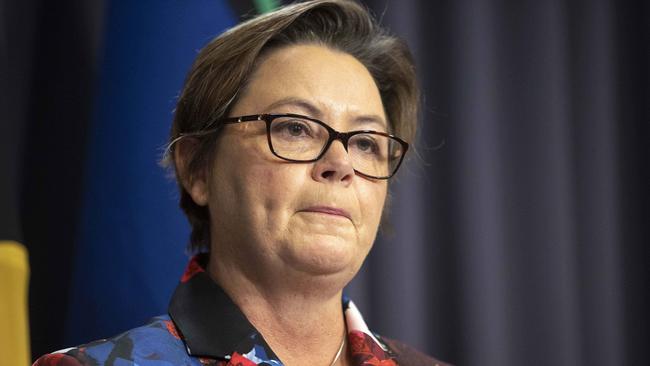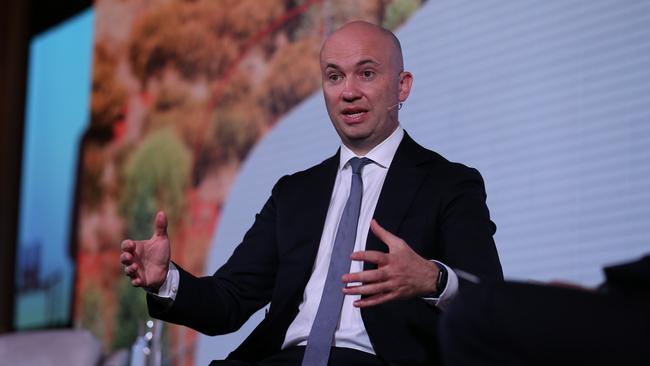ConocoPhillips says federal intervention in the domestic supply market could backfire
US oil giant ConocoPhillips has warned the federal government against intervening in Australia’s domestic gas market.
US oil giant ConocoPhillips has cautioned Anthony Albanese against intervening in the domestic gas market, saying it could backfire by increasing supply shortages.
The warning comes as Labor has hinted a looming crackdown aimed at cutting prices may fail to satisfy both producers and manufacturers.
Conoco — which owns 47.5 per cent of Queensland’s Australia Pacific LNG gas export plant with takeover target Origin Energy and Sinopec — said a range of measures, including price caps and windfall taxes, would worsen a domestic gas crunch.
“There has been a lot of noise recently about price caps and windfall profits tax to reduce the cost of gas. I respect the intentions of the government, but having built a reputation and attracted this scale of investment, it does not make sense for Australian policymakers to now risk these hard-fought gains by adopting policies that have failed elsewhere,” ConocoPhillips Australia president Dan Clark writes in The Australian.

“While interventionist policies may lower short-term domestic prices they also artificially stimulate demand and tend to restrict supply, leading to gas shortages.
“Simple economics rule here. You tax what you want less of. The way to reduce prices is to increase supply. Taxes do not reduce prices. Price caps do not encourage supply.”
Federal Resources Minister Madeleine King said both producers and manufacturers may not ultimately be happy with the government’s final decision, expected to land before Christmas.
“It’s a difficult time in the global energy world, so I don’t expect everyone will be entirely happy. Manufacturers might not get exactly what they want but gas producers also might not get what they want,” Ms King told The Australian.
“But this is an important compromise government has to look to apply to make sure we can have an affordable gas market into the future.”
A gas price cap “was among the options we are looking at,” Ms King said. “That is logical as a means of controlling pricing.”
However, it was also conscious of not damaging Australia’s sovereign risk profile.

“It’s about making sure we come up with a solution that works. Accepting that things can have unintended consequences. So we’re making sure we work through all the scenarios that we can, so that that does not happen,” Ms King said. “There is thoughtful consideration to deliver better gas prices for consumers, but also manufacturers.”
Federal and state energy ministers will descend on Gladstone, home to Queensland’s three LNG export facilities, for a final meeting of the year in early December.
NSW Treasurer and Energy Minister Matt Kean said a fix for both coal and gas was needed, after previously calling for a level of volumes for the commodities that producers have to supply locally before considering exports.
“Gas sets the price less than half the time of coal in NSW. So doing gas alone is not going to do the job,” Mr Kean told The Australian. “The Commonwealth government need to fix this. They’ve said they are going to come back with a solution and we are waiting to hear from them.”
Conoco’s partner in APLNG — Origin Energy — also raised concerns last week over a planned intervention in gas markets by the Albanese government, warning it was worried about the “unintended consequences” of a price cap being introduced.

Big energy users have been calling for a gas cap of $10GJ for domestic prices.
Large manufacturers are being offered gas contracts for 2023 at rates up to five times the levels being offered a year ago with Labor warning factories will shut down unless it makes an urgent market intervention to cut prices.
Conoco pointed to botched intervention in Argentina as a warning sign for Australia.
“Facing similar drivers to lower gas prices, other governments have attempted price controls and interventions with ultimately negative outcomes,” Mr Clark said.
“Despite having vast hydrocarbon potential, Argentinian government intervention led to the country’s sovereign default. International oil and gas companies exited the country, investment dried up and production dwindled. Intervention measures and government subsidies failed to curb inflation.”
Gas users have been starting to purchase their contracts for the next 12 months on the expectation prices would surge next year, piling pressure on the Albanese government to execute its intervention method before Christmas.
Conoco also pointed to the effects of historic windfall taxes, a mooted policy again under consideration by Joe Biden.
“Windfall profits taxes are not new and have been tried unsuccessfully elsewhere in response to rising inflationary pressures,” Mr Clark writes.
“US President Jimmy Carter’s 1980 tax response to a doubling of oil prices caused by the Iran Revolution and the deregulation of the industry had the unintended consequence of reducing domestic oil production and increasing reliance on foreign oil between 1980 and 1988.”
“Australia is, and has been, an exceptional economic player, but it should not expect different results by repeating the mistakes of other countries.”






To join the conversation, please log in. Don't have an account? Register
Join the conversation, you are commenting as Logout